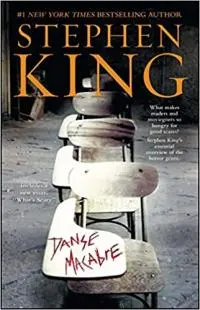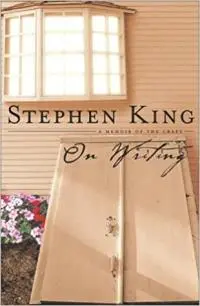In 2014 I decided to reread all of Stephen King’s books in the order they were published. Richard Chizmar of Cemetery Dance had started the Stephen King Revisited project that November, and invited others to join in. Grady Hendrix did something similar with his Great Stephen King Reread over at Tor.com. Both gentlemen blogged about the books, and I did likewise. I wouldn’t put my essays up against theirs nor those of Bev Vincent, but I blogged before and after my reading of each book.
I revisited many old favorites and caught all the books I had missed over the years. As of the time of this writing, Billy Summers is King’s latest release, so that makes over 70 books and counting.
We tend to think of Stephen King as a fully formed author from the start, and with his first four releases being Carrie, Salem’s Lot, The Shining, and The Stand, it’s hard to imagine him going through developmental stages in his career. As I caught up to the present in his catalog of work, three phases or seasons came to light. The change between seasons was marked by a specific exploration of writing and “what was next.” These explorations were then followed by new work that marked a realization of those searches for what came next. As a result, we might now find ourselves in the most compelling season of Stephen King’s writing career to date.
The First Season of King
Stephen King started out as a struggling writer. If one of the kids got sick or something broke on the car, the budget got very tight for him and his wife. He wrote a lot of characters who were teachers or blue-collar workers before he found himself writing about writers as he tends to do now. The windfall sale of Carrie took him by surprise, so much so that he thought he heard the numbers wrong when they told him how much he was going to make. That changed everything.
 Even early on, Stephen King found himself competing with his previous successes, something he would do through much of his career, which started in the 1970s and spans the early decades of the 21st century. He has expressed it sometimes troubles him that so many readers’ favorite books are the ones he wrote near the beginning of his career.
Even early on, Stephen King found himself competing with his previous successes, something he would do through much of his career, which started in the 1970s and spans the early decades of the 21st century. He has expressed it sometimes troubles him that so many readers’ favorite books are the ones he wrote near the beginning of his career.
Compared to the iconic books that made him popular, novels like The Dead Zone, Firestarter, and Christine felt like they didn’t fare as well. These would go on to become culturally significant, but at the time of publication, critics weren’t always kind, and King often felt dismissed as simply a popular writer as opposed to an accomplished one. In The Dead Zone, when a number of kids die in a club fire, King has one of his characters say, “This is just like that novel Carrie!” He himself was struggling with the notion that his work was repeating itself instead of doing something new.
It’s also worth noting that he was struggling with addiction during this season, and that would come to a turning point in the second part of his career.
Danse Macabre - The Way Forward
As he entered the 1980s, Stephen King agreed to write a nonfiction “history of horror” that became Danse Macabre. It covered horror in literature, movies, and television up to that point in time. It discussed the structure, style, and approaches of telling horror stories. It’s fun to see King mention promising young writers in the book who are seen as old veterans of horror writing now. Even though it was published in 1981, I believe Macabre still holds up, and the discussions in the book are still relevant. That is no small accomplishment.
I was curious as to why King took a step back from fiction to write this. His career seemed to be going gangbusters from my perspective all these years in the future, where critics and award committees have finally relented and recognized his significance. Today, every scary dog is referred to as Cujo and The Gunslinger, which started off as a disorganized serial few people saw, would become a novel and then a multi-book epic. Back then, I think King used the research and writing of Danse Macabre to answer the question “What’s next?”
The Second Season of King
The ideas King fleshed out in Danse Macabre started to show up in the work that followed. Many of those 1980s novels did not execute those concepts perfectly, but they served to develop them. The culmination of those explorations came together and were fully realized in the novel It, published in 1986.
It was the first Stephen King novel I ever read. It is one of his longest books, and features many of the positives and negatives noted in other King works. Over the years, I started to believe It was more flawed than I first thought when I read it in my teens, launching my love of horror and Stephen King in particular. Upon rereading it, I think the novel stands up, and marks a high point in the second season of King's career. This was where he clearly found his way forward.
In this season, we would get the next Dark Tower novels, which for many readers would become their favorites in the series. While some of his novels in the final decade of the 20th century would be better than others, there were plenty of highlights. The Green Mile, in my mind a very close 2nd place for the best story he ever wrote, was produced in this period.
In 1987, his wife would dump out the contents of his trashcan in front of his family and friends during an intervention. There were a lot of bottles, but also what King has referred to at different times as bent spoons stained with blood and snot. He would go through rehabilitation and the AA process he included in detail in the novel Doctor Sleep some years later. He got clean and would remain so. The degree to which his struggle with addiction and then his acclamation to sobriety impacted his writing is difficult to quantify but impossible to deny.
One of the key criticisms that haunted him during this period was that his work was uneven. He would reach a critical turning point as he repeated the process he had gone through with Danse Macabre.
On Writing – The Way Forward
In 1999, Stephen King was struck by a van operated by a distracted driver while walking along the side of a road near his home. He came within inches of dying. Severely injured, he would take years to recover both physically and mentally. The accident and the driver himself would appear in the Dark Tower series. The shadow of it would hang over most of the work that followed. The driver, who had substance abuse issues of his own, would eventually die on Stephen King’s birthday. Stephen King bought the van at an auction and beat it apart with a sledgehammer. He worried that taking pain killers after the accident might endanger his sobriety, but he managed to stay clean and sober.
At the time of the accident, he was in the midst of drafting On Writing, meant to be a guide to aspiring authors. As with Danse Macabre, this book was an exploration of horror, but focused more specifically on the craft of writing. There would be a lot of personal memoir in the book, about him growing up and growing as an author. The van accident and recovery loomed large in that work, especially as it related to returning to writing afterwards. Like Danse Macabre, I got the sense that he was trying to find his way forward, even before the accident happened.
The Third Season of King
As a reader going through his catalog in order and a reader who loves all of Stephen King’s books, I did find the quality of his work uneven leading up to On Writing and following the accident. There were great novels intermixed with less stellar ones. A couple trunk novels were dusted off and reworked (Blaze and Under the Dome) to mixed results. I loved From A Buick 8, but I understand why others don't. I loved Lisey’s Story, which at one point King called his best novel.
 Many readers love King’s short story collections most. I’m a big fan of 1993’s Nightmares and Dreamscapes. Some of my favorite King short stories are in there, but upon rereading that volume, I realized it was sort of a clearing house of leftovers, including screenplays and essays along with short stories. In the introduction to 2008’s Just After Sunset, King admitted he went nearly a decade neglecting short story writing. He felt the art had decayed within him, and needed to be reawakened. Doing so, revitalized him as a writer.
Many readers love King’s short story collections most. I’m a big fan of 1993’s Nightmares and Dreamscapes. Some of my favorite King short stories are in there, but upon rereading that volume, I realized it was sort of a clearing house of leftovers, including screenplays and essays along with short stories. In the introduction to 2008’s Just After Sunset, King admitted he went nearly a decade neglecting short story writing. He felt the art had decayed within him, and needed to be reawakened. Doing so, revitalized him as a writer.
He had stalled on The Dark Tower series, and as he wrote himself into the story, he scolded himself for those failings, but he finished it in rapid order. There was an urgency to get it done because he feared dying before it was completed. His own sense of mortality seemed to mark the early transition into this third season in many ways.
I’m not sure exactly when it happened, but around this time something big shifted in his writing. There was a hint of it with Duma Key. I’m positive that this change was firmly in place by the novella collection Full Dark, No Stars or with 11/22/63, which I consider to be his best novel. From this point forward, any accusations that Stephen King’s writing is uneven or inconsistent are unfounded.
This period in King’s career is marked by consistently great novels, and I would argue that his best writing has been done in the last ten years. I like The Shining better than the sequel, Doctor Sleep, but I believe that might be from the years of cultural significance The Shining holds, because Doctor Sleep is probably a better written novel with an overall stronger storyline. Joyland is a lesser-known work from this season that I might place in his top five novels of all time. The Bill Hodges trilogy is great all the way through. If It Bleeds, his latest novella collection, is many readers’ favorite. Multiple people I know, both Stephen King fans and those who don’t care for his work as much, are praising Billy Summers as the best they’ve read from him or the best they’ve read in a long time.
If Stephen King happens to read this article, my sincerest hope as a Constant Reader is that he takes away the conclusion that he is doing the best work he’s ever done right now.
What’s Next?
A lot, I hope. I hope this season of excellence continues for a very long time.
Is there a fourth season on the horizon? If King persists, I imagine there would have to be. I’m not sure what it would be, though, or if that transition might be marked by another nonfiction exploration of the craft.
If there is a fourth season brewing, I think maybe the short book Elevation might be a hint of where it will take us. It seems to be an outlier in his recent work. If the transition to the second season was marked by addiction and trying to avoid repeating himself, and the transition to the third season was marked by recovery, mortality, and an emerging consistent excellence, then the coming fourth season might be King stretching in new directions and writing “off-brand” stories, things he wants to do with the time he has left. If that is the case, I’m not sure how it will be received by readers or critics, but as King has said on multiple occasions, he has outlived most of his critics and is still going.
Get Danse Macabre at Bookshop or Amazon
Get On Writing at Bookshop or Amazon

About the author
Jay Wilburn lives with his wife and two sons in beautiful Conway, South Carolina. He is a full-time writer of horror and speculative fiction. Jay left his job as a teacher to become a full time writer and has never looked back. Well, that’s not entirely true. He wants to be sure he isn’t being followed, so he looks back sometimes.








